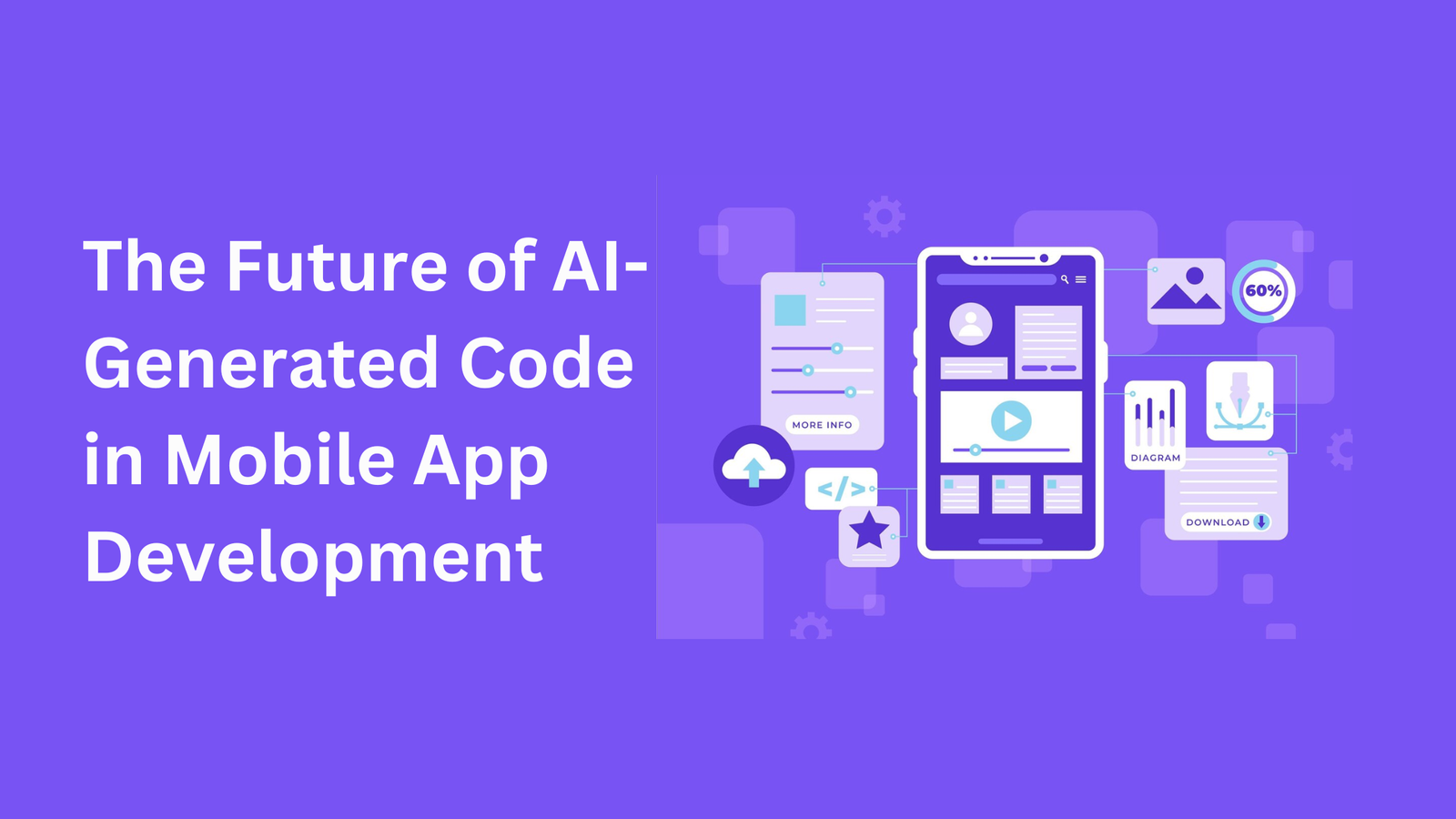Introduction: The Rise of Machines That Code
You’ve likely heard of AI writing books, composing music, and even making art. But here’s a twist you didn’t see coming—AI is now coding. Not suggesting code. Not just auto-completing lines. We’re talking end-to-end AI-generated code that can build a mobile app’s bones in minutes. Sounds like the kind of Silicon Valley fever dream that fizzles out in a year, right?
Except it’s not.
The fusion of artificial intelligence with mobile app development is moving faster than most realize. For developers, startups, and enterprises alike, AI-generated code is no longer a novelty. It’s poised to redefine how apps are built, scaled, and shipped.
This isn’t science fiction. It’s the next phase of digital evolution. And this blog is your front-row seat to that transformation.
What Exactly Is AI-Generated Code?
Let’s clarify one thing: AI-generated code isn’t replacing developers. It’s reshaping what they do. AI coding tools—like GitHub Copilot, Amazon CodeWhisperer, Tabnine, and more—use large language models (LLMs) trained on billions of lines of open-source code. These models can write new code snippets, generate entire functions, or even build app modules based on natural language prompts.
Say you type: “Build a login screen with two-factor authentication in React Native.” The AI could generate a scaffold of that screen in seconds. And yes, it’s real code that runs.
These tools don’t “understand” code like a human. They predict it. It’s autocomplete on steroids—driven by patterns, probability, and massive data sets. But despite their current limitations, AI coding assistants are showing surprising levels of accuracy and adaptability.
Why It’s a Game-Changer for Mobile App Development
Let’s not tiptoe around it—mobile app development is hard. You’re juggling frameworks, frontends, APIs, backend logic, security, cross-platform compatibility, user flows, and a sea of testing. Time is money, bugs are landmines, and the talent pool is tighter than ever.
AI-generated code addresses multiple pain points:
- Speed: What used to take hours now takes minutes. A simple screen, a complex animation, or even database queries—AI can generate them instantly.
- Productivity: Developers spend less time on boilerplate code and more time on innovation. That login screen? Done. Now let’s talk about user personalization or gamification.
- Error Reduction: AI models are trained on clean, often battle-tested code. They’re less likely to forget a semicolon or call an undefined variable.
- Learning Aid: Junior devs can see real-time examples of how code works, in context. It’s like pair programming with a machine that’s read every Stack Overflow post ever written.
So, are we heading toward a future where an app is just a prompt away?
Not quite. But we’re getting close enough to start asking real questions.
The Technology Behind the Magic
If you peek under the hood of AI-generated code, you’ll find large language models like OpenAI’s Codex, Meta’s Code LLaMA, and Google DeepMind’s AlphaCode. These models use transformer architectures and are trained on repositories from GitHub, documentation sites, Q&A platforms, and more.
It’s all about pattern recognition. These models “learn” by identifying correlations between human language and source code. When you type a prompt like “Create a weather app with geolocation,” the AI breaks down the sentence, maps it to a known sequence of actions, and generates relevant code.
The output is never random—it’s a hyper-calculated guess based on billions of prior examples. And these guesses are getting sharper with every iteration.
But here’s where it gets more interesting: models are increasingly multi-modal. They don’t just understand text—they can also generate UI wireframes, API schemas, and even testing protocols. All from a plain-English description.
We’re not talking about a glorified autocomplete tool anymore. We’re watching the early phases of AI as a co-developer.
Real-World Applications and Case Studies
This isn’t just a playground for solo developers. AI-generated code is already transforming teams at scale. Consider these examples:
- Shopify built a proprietary AI assistant that helps internal developers write faster code and reduce error rates. They reported a 30% improvement in time-to-feature-release for their mobile apps.
- Replit, a browser-based IDE, lets developers use Ghostwriter—its AI assistant—to generate app components in Python, JavaScript, and more. It’s already used in classrooms, bootcamps, and enterprise teams.
- Uber uses AI tools to help audit and maintain legacy mobile codebases—an otherwise painful task that typically eats into productive engineering hours.
- Startups are leveraging AI to launch MVPs (Minimum Viable Products) in record time—sometimes under 72 hours—by auto-generating scaffolds for mobile apps.
Across the board, AI is not a novelty feature. It’s becoming a core productivity engine.
Challenges, Myths, and Real Risks
Of course, it’s not all sunshine and seamless deployments. There are real, grounded concerns about AI-generated code—some overblown, others deeply valid.
- Security Vulnerabilities: AI models may generate insecure code if their training data included bad practices. A model might write a login function but forget to hash passwords properly.
- Plagiarism and Licensing: If a model is trained on copyrighted code, who owns the AI-generated output? This has led to lawsuits and copyright debates, especially around tools like Copilot.
- Lack of Context: AI doesn’t know your product’s goals, your database schema, or your API integrations—unless you explicitly tell it. It can hallucinate code that doesn’t fit the bigger picture.
- Overreliance: There’s a risk that developers, especially new ones, might become too dependent on AI and skip the deeper learning that ensures long-term expertise.
- Debugging Nightmares: AI can generate obscure or inefficient code that works—but no one understands why. When it breaks, the fix can be a rabbit hole.
So while AI is here to help, it’s not here to replace diligence, skill, or human judgment.
How Developers Are Evolving With AI
If you’re a developer, AI doesn’t spell doom. In fact, it might just be your best colleague—if you know how to work with it.
The new dev toolkit now includes prompt engineering. Knowing how to frame a question for optimal code output is becoming a valuable skill in its own right.
Teams are rethinking workflows: from code reviews that include AI suggestions to test-driven development where AI writes the first draft of unit tests. Agile standups now include updates like “the AI handled the onboarding flow, I just optimized it.”
It’s collaborative development, redefined.
And let’s be honest—AI isn’t just saving time. It’s injecting creativity. Developers are trying new architectures, frameworks, and languages they previously avoided, simply because the barrier to entry is lower.
That’s not just productivity. That’s exploration.
What This Means for Startups and Enterprises
For startups, AI-generated code is a golden ticket. Time-to-market is a make-or-break factor, and AI cuts that time dramatically. Founders can go from idea to prototype over a weekend—test, iterate, and pivot faster than their competitors.
Enterprises see a different kind of win: scaling development across teams and geographies without ballooning headcount. AI allows mid-size teams to do enterprise-scale work—securely, efficiently, and often more creatively.
It’s also democratizing app development. Non-technical founders, product managers, and business analysts can now describe features in plain language and have AI generate a working baseline. The technical bottleneck is starting to loosen.
This doesn’t make developers less relevant. It makes them more strategic. When the routine is handled, innovation takes center stage.
The Future: What Happens Next?
Here’s where it gets thrilling.
We’re moving toward AI-native development environments—places where you don’t just write code but co-create with intelligent agents. Think about VS Code or Xcode morphing into AI-first platforms, with contextual assistants that know your project, detect bugs before they happen, and suggest features based on user feedback trends.
In the next few years, we might see:
- AI-powered app builders that let you drag, drop, and describe features in real time
- Voice-based development where you speak out app logic
- Hyper-personalized mobile apps crafted by AI, tailored to niche user segments
- Federated training models where your AI learns specifically from your codebase and team style
- AI compliance checkers embedded into CI/CD pipelines for GDPR, HIPAA, and more
This won’t just transform how apps are made. It’ll reshape who can make them.
Conclusion: Code Smarter, Not Harder
Let’s clear the air—AI-generated code isn’t the end of developers. It’s the evolution of them.
We’re entering an era where coding is becoming conversational, creative, and collaborative. Where AI isn’t just assisting the work—it’s accelerating it. It’s not replacing thought. It’s redistributing effort.
Mobile app development will never be the same. And that’s a good thing.
For those seeking agility, precision, and innovation, embracing AI-generated code isn’t just a tech decision—it’s a strategic one. And for businesses looking to stay competitive in the age of automation, working with forward-thinking partners like mobile app developers in Atlanta could be the smartest move you make this year.
The future is writing itself. All you have to do is hit “Run.”












Leave a Reply